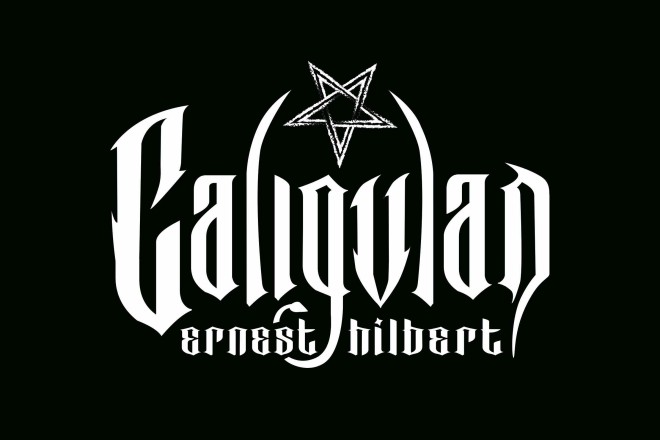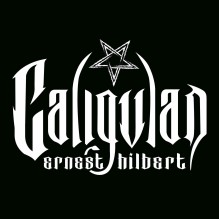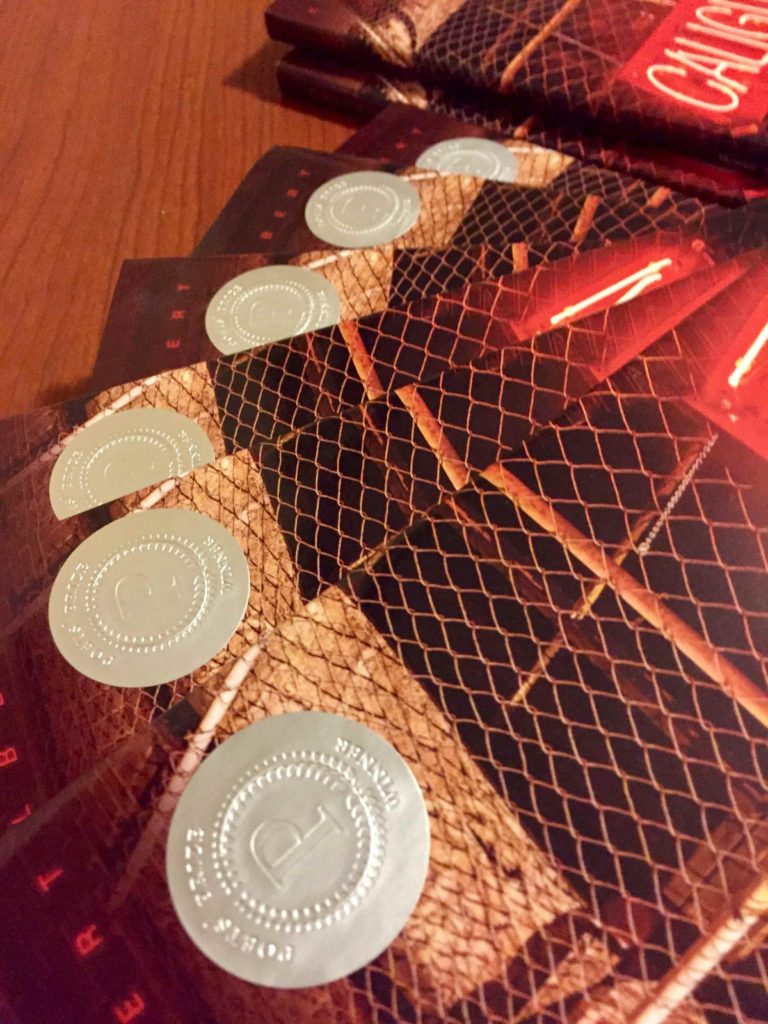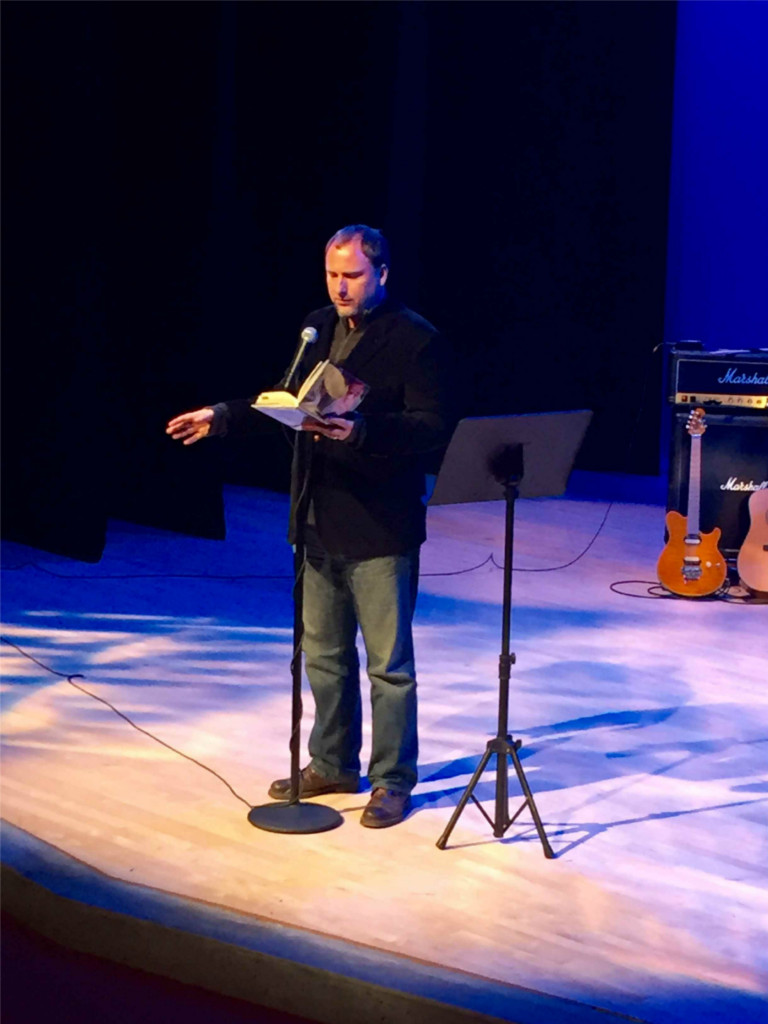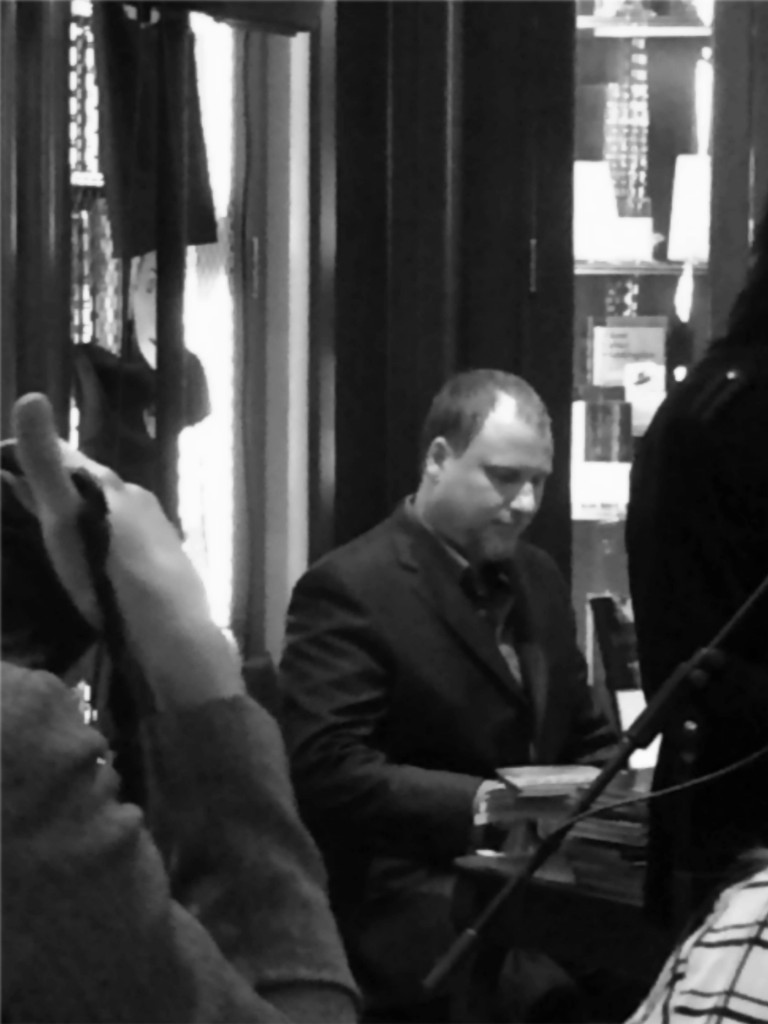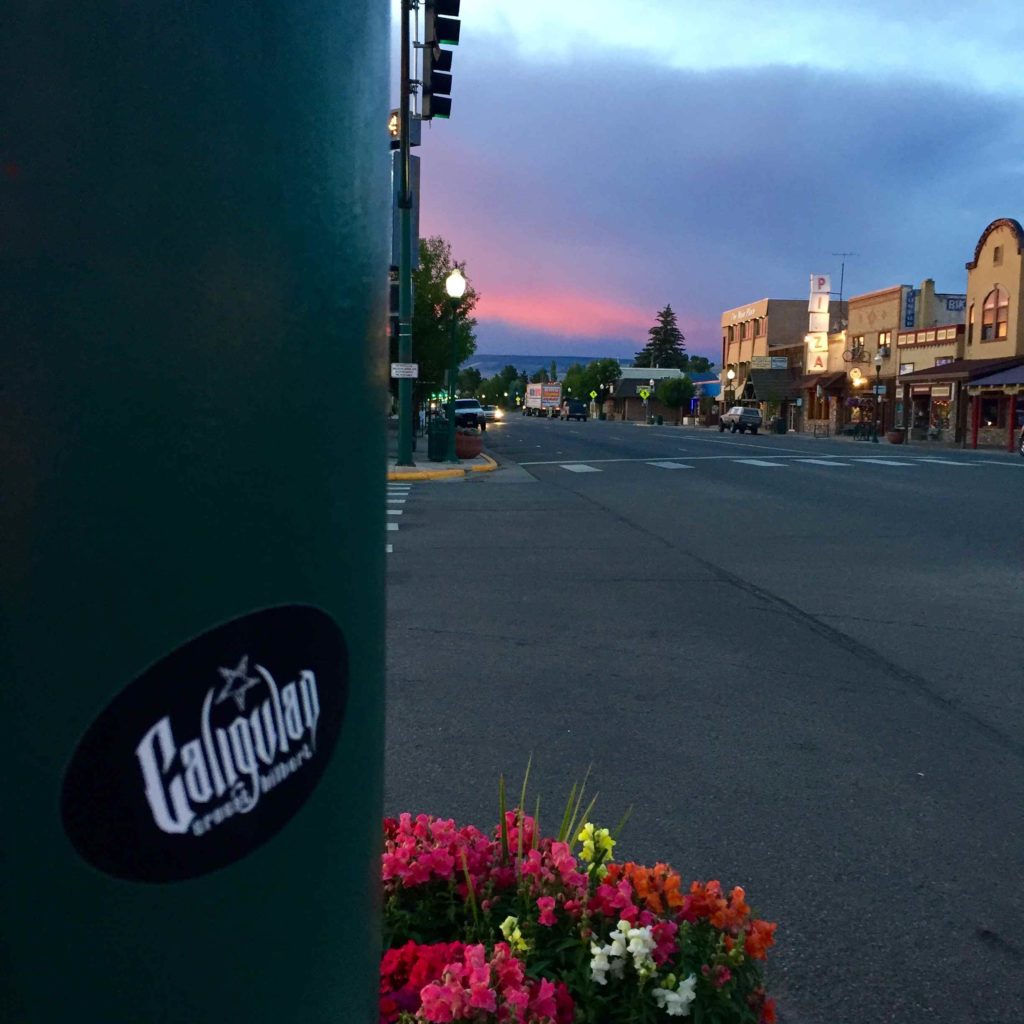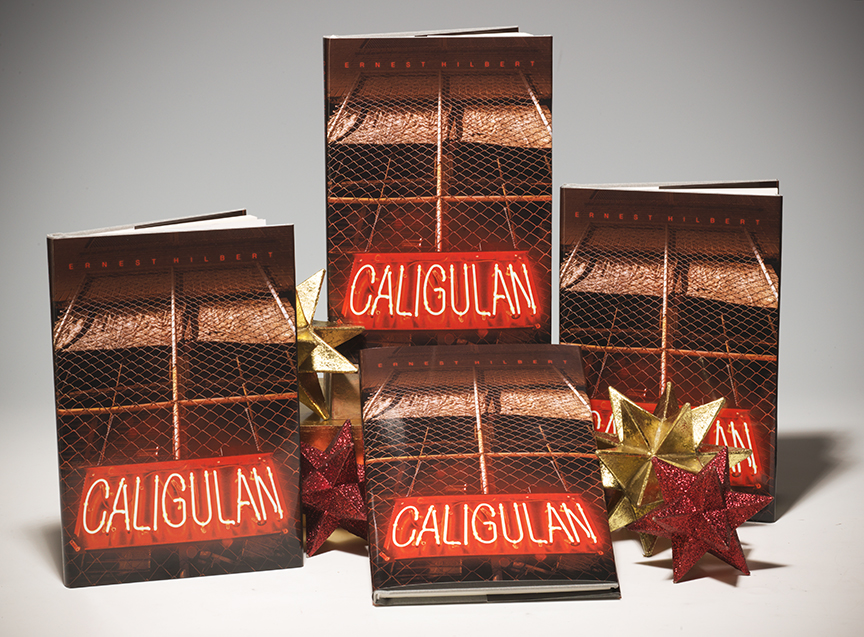“Moved by beauty, attuned to the sublimity of natural things, livened by paradox, coaxed into song by pentameter, Ernest Hilbert’s rich new book covers more emotional ground than a reader has any right to expect.” – Rowan Ricardo Phillips, author of When Blackness Rhymes with Blackness
“BRUTAL AND YET BEAUTIFUL”: CALIGULAN BY ERNEST HILBERT
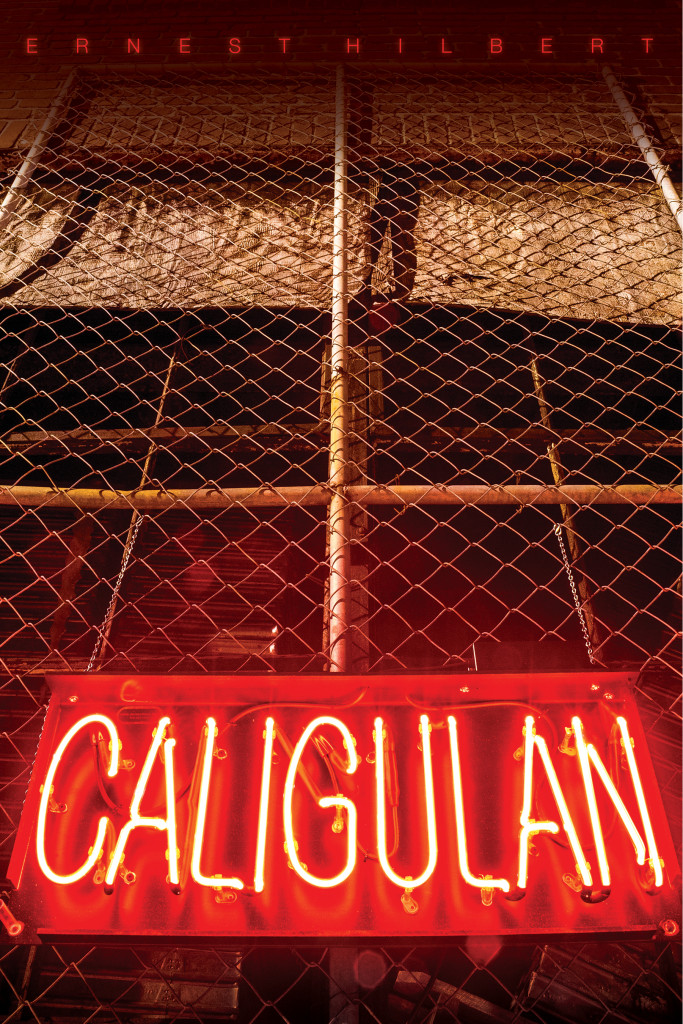 HILBERT, Ernest. Caligulan. Evansville, IN: Measure Press, 2015. Tall octavo, full fossil-gray cloth, pictorial dust jacket. $20. ISBN-13:978-1-939574-13-8
HILBERT, Ernest. Caligulan. Evansville, IN: Measure Press, 2015. Tall octavo, full fossil-gray cloth, pictorial dust jacket. $20. ISBN-13:978-1-939574-13-8
Available from Amazon, Amazon UK, Amazon France, Amazon Spain, Barnes & Noble, Powell’s, Books a Million, Waterstones (UK), Tower Books, Book Depository, Russell Books (Canada), Readings (Australia), Fishpond (Australia), Booktopia (Australia), Adlibris (EU), Kraina Ksiazek (Poland), Alibris, BOL (Netherlands, Belgium), Adlibris (Finland), Percuma Penghantaran (Malaysia), Wordery, directly from the publisher, and in better bookstores (if it is not in stock, most booksellers can have it within a day or two on request).
Ernest Hilbert’s third collection of poems, Caligulan, is at once terrifying and touching, a book haunted by the poet’s many affections and angers, its poems animated by horror films and science-fiction novels, heavy metal and opera, remote wilderness and ruined cities. Departing from the experimental sonnet forms he pioneered in his earlier books, Hilbert delivers a chorus of poems that are conversational and bizarre, stormy and surreal; brash, abrupt, sometimes scathingly sarcastic, and always dexterously accomplished. In four chapters of fourteen poems each, Hilbert leads the reader through modern America’s triumphs and tragedies, elusive consolations and primeval horrors, all the while telling jokes, posing questions, and sounding warnings of things to come.
Caligulan was selected as the winner of the 2017 Poets’ Prize. Finalists were Donald Hall’s Selected Poems and Joseph Harrison’s Shakespeare’s Horse. The prize, created in 1988 by Robert McDowell, Frederick Morgan, and Louis Simpson, has recognized the achievements of poets such as Miller Williams, Marilyn Hacker, Maxine Kumin, Adrienne Rich, and Marilyn Nelson. Hilbert read from the collection at a ceremony held at the The Nicholas Roerich Museum in New York City to honor the prize.
The poems in the collection first appeared in American Arts Quarterly, American Poetry Review, Asheville Poetry Review, At Length, Battersea Review, Birmingham Poetry Review, B O D Y, Boston Review, Clarion (Boston Poetry Union), Cleaver, The Dark Horse, Edinburgh Review, Hopkins Review, Hudson Review, Measure, Parnassus, Philadelphia Inquirer, Listen: Life with Classical Music, New Criterion, Smartish Pace, and Yale Review. A recording of Ernest Hilbert reading “Broad and Washington,” engineered by Peter Crimmins, was broadcast on WHYY/NPR 90.7FM as part of the News Works Tonight New Year’s program the evening of December 31, 2013. “Atlantica” appeared in autumn 2014 as a limited edition broadside poster from Lithic Press.
The book is set in Baskerville. The neon “Caligulan” sign that appears on the book’s cover was commissioned by Hilbert and manufactured by Jantec Sign Group in North Carolina. Cover and author photographs are by Matthew Wright. The gray cloth binding places the book in the company of first editions of W.H. Auden’s Look, Stranger! and Philip Larkin’s High Windows. The dust jacket was designed by Jennifer Mercer, who designed the covers for both of Hilbert’s previous collections as well as the cover of his album. On the dust jacket, Hilbert’s name appears in Helvetica Neue (T1) Regular, inspired by the title sequence to Ridley Scott’s 1979 film Alien. The film’s title sequence, which has been alternately described as a “slight variation on Futura” or “a disjointed version of Helvetica Black,” was created by Richard and Robert Greenberg of R/Greenberg Associates and was their second major film title after Superman (1978). Mercer also designed the “black metal” logo-style “Caligulan” with devil’s tail enfolding the author’s name, admitting that it taxed her to the limit of her “black-metaling skills.” The logo appears on stickers as well as tour t-shirts screen-printed by Devilfish Ink in Philadelphia. The reverse of the t-shirts features the “Sixty Nights from Sixty Sonnets to Caligulan” list of sixty Hilbert readings that comprise his tour for the first two books.

Hilbert reads from Caligulan at the Philadelphia launch at Fergie’s Pub, where he performed with Quincy Lehr and the band the Keystone Swingbillies. Photo credit Niamh O’Connell.
* * *
SELECTIONS FROM THE COLLECTION
- “Insomnia Redux” and “Hotel Water Deemed Safe Despite Corpse” originally appeared in The Hudson Review
- “For Lynn, at Lake Nockamixon” appeared in At Length
- “Kite” appeared in Parnassus: Poetry in Review
- “Apparition at Mosse-Hanne” appeared in The New Criterion
* * *
There’s much pleasure, clarity, and discipline to the way Ernest Hilbert looks around him in Caligulan, at the complicated textures of city and landscape, and at all the stuff, the materials, the detritus, that make up a place, a time, and a life. In these easily formal, easily idiomatic poems you’ll read about a dishwasher—his “arsenal of cutlery, / The spider-eggy fluff / That clings like mold to crockery”—and you’ll also meet the stuffed moose at a science museum: “You still startle, filling half the false sky . . . . // You tower / In the same black forests I’ve traveled lately.” Hilbert gets the details right, and he also gets the emotions right. “The smoke alarm fails, and your computer crashes” while an ATM is “pitiless, displays a message for / Insufficient Funds.” But there’s also this: “You want to fight. / You spit and shout. In daydreams you sing.” This is a book full of the real, and also full of heart. – Daisy Fried, author of Women’s Poetry: Poems and Advice
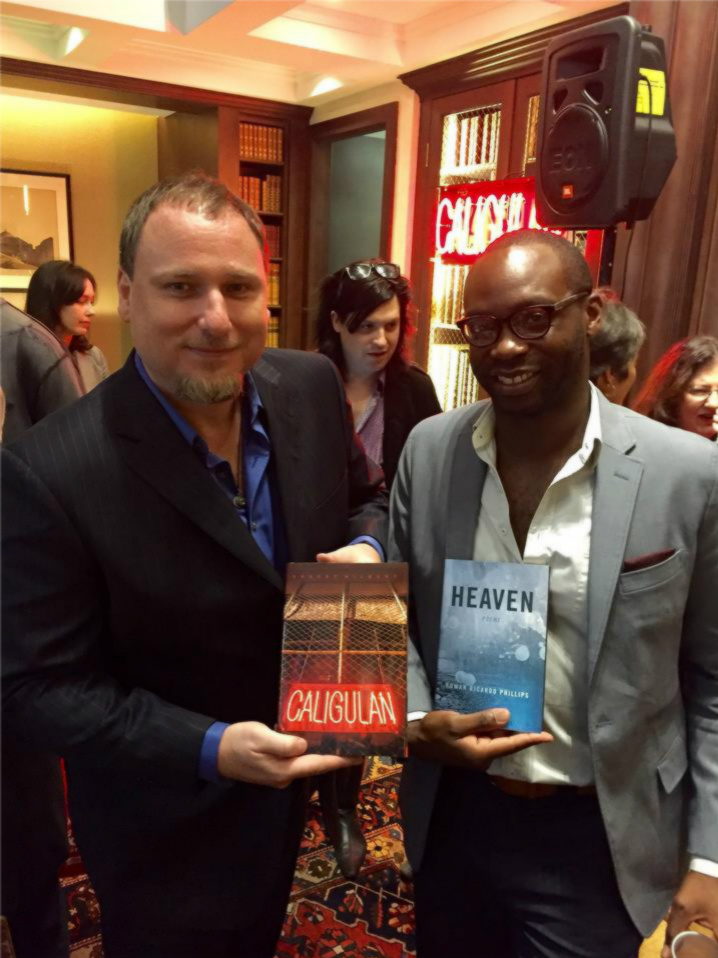
Hilbert with Rowan Ricardo Phillips, who introduced Hilbert at the New York City launch for Caligulan.
* * *
To give you an idea of Hilbert’s black-bile humor, his Eeyoric temper (or Yorick, perhaps), the title of his previous collection, Caligulan, is a word of his own coinage. Hilbert goes on for two pages giving a full dictionary entry for his newly minted adjective, a condition that denotes, among other things, “an abnormal and overwhelming sense of apprehension, marked by physiological signs . . . by doubts concerning the reality and the nature of an unspecified threat, and by self-doubt about one’s capacity to address it” or “an inclination to use threats and the menace of violence to keep a person or group of people in a state of intimidation and unease” and “a sense that something is very, very wrong.” It’s eerie now, rereading these definitions, at how this speaks so specifically to the moment. Even eerier, though is the final sentence of the entry: First known use 2015, USA (emphasis, mine). The book, seemingly a product of the Zeitgeist, was in fact arguably prophecy of 2016 and beyond. – B O D Y Magazine, on Caligulan
There are books of poetry that, if only readers could be induced to pick them up, might change their minds for good about the supposed incomprehensibility, preciousness, and irrelevance of modern poetry. Ernest Hilbert’s new collection, Caligulan, belongs to that rare class. After his beautifully rendered Sixty Sonnets and the eloquent All of You on the Good Earth comes this richly wrought new collection. Hilbert is a classicist in the finest sense of the term: he has a firm grip on the formal orders that have dominated the great tradition of Anglophone verse from the skalds of Beowulf and the Pearl Poet to the tight gems of darkness of Thomas Hardy, and he uses them to write poems that ring with very contemporary truths. A skillful artificer of forms of verse that have sometimes gone wanting or are unjustifiably neglected or despised after the earthquakes of modernism, he is afraid of neither tight meter nor demanding rhymes: he proves there is nothing whatsoever anachronistic about well-tooled verse; the rage of authenticity can speak as sharply in a sonnet as in a calligramme. – Christopher Bernard
* * *
Hilbert’s book, Caligulan (Measure Press, 2015), came out a year before the last presidential election, but accurately predicts the anxiety of recent years, and provides language for us to talk about it. The title poem, in particular, embodies and enacts some of my own lifelong negative associations with the US: a sense of ubiquitous suffering, of being surveilled, of powerlessness and stress . . . . Anxiety transmits a sense of gruesome foreboding, of things that might happen. Hilbert’s poem admits, as Buddhism does, that suffering is omnipresent and death is inevitable, but then responds, “And so what?” After all, there will be a myriad of slight wounds every day of our lives. Perhaps it’s better just to face our Caligulan nightmares with a wry grin, and learn to befriend the dread. – The Rumpus
Ernest Hilbert is a formalist, and a skilled one. He is well aware of the poem’s ability to wrest itself away from the poet (this is, after all the subject of “Kite”), but he is also aware of the shaping power of the imagination, and how it can redeem a world of dread. It is this exalted sense of the power of the act of poetic making that truly marks Hilbert as a Romantic, more so even than his love of nature or his occasional flirtations with the notion of the alienated poète maudit. And, while the poems of Caligulan come to us from a political era now ended, this faith in imagination as a cure for pervasive dread marks Hilbert as an important poet for the new and dreadful era of American public life upon which we are now entering. It will be a Caligulan time, for which we will need books like this. – Literary Matters, Association of Literary Scholars, Critics, and Writers
* * *
I loved Caligulan. There is something so satisfying about the rhythm and form of these poems, like they’re cut in stone. The book reminds me of what I love about Don Paterson, Heaney, and Larkin (and Bishop!).
– John Wall Barger, author of The Book of Festus
* * *
The voice most characteristic of Mr. Hilbert’s work sounds something like a punk-rock Wordsworth, or a heavy-metal Milton, melding grandeur and the Grand Guignol, squalor and prophecy, in a kind of snarling sublime. In Caligulan, this voice fulfilled its potential: trash, noise, madness, death, and chaos create a kind of ambient howl, like a vortex within which characters flung hither and thither frantically try to make sense of their lives. The effect is at once uncanny and undeniably familiar. Reading Caligulan is something like walking the neighborhood while listening to the second movement of Shostakovich’s String Quartet No. 8 on repeat. – The Hopkins Review
* * *
* * *
Caligulan delivers on all of its title’s promise. Every poem evokes the world we live in: we know something is wrong and, in a minute, will likely be worse; but there’s beauty in the portent and in the self-awareness we need to see it. Hilbert’s remarkable ability to draw a scene so clear you immediately make yourself at home, and so suggestive you want to get out because you know you can’t settle in, makes this collection a page-turner in a way most poetry books can never be. – Erica Dawson, author of Big-Eyed Afraid
* * *
Hilbert’s best work shows us the beauty in our failings. – J.G. McClure, on Caligulan in Cleaver Magazine
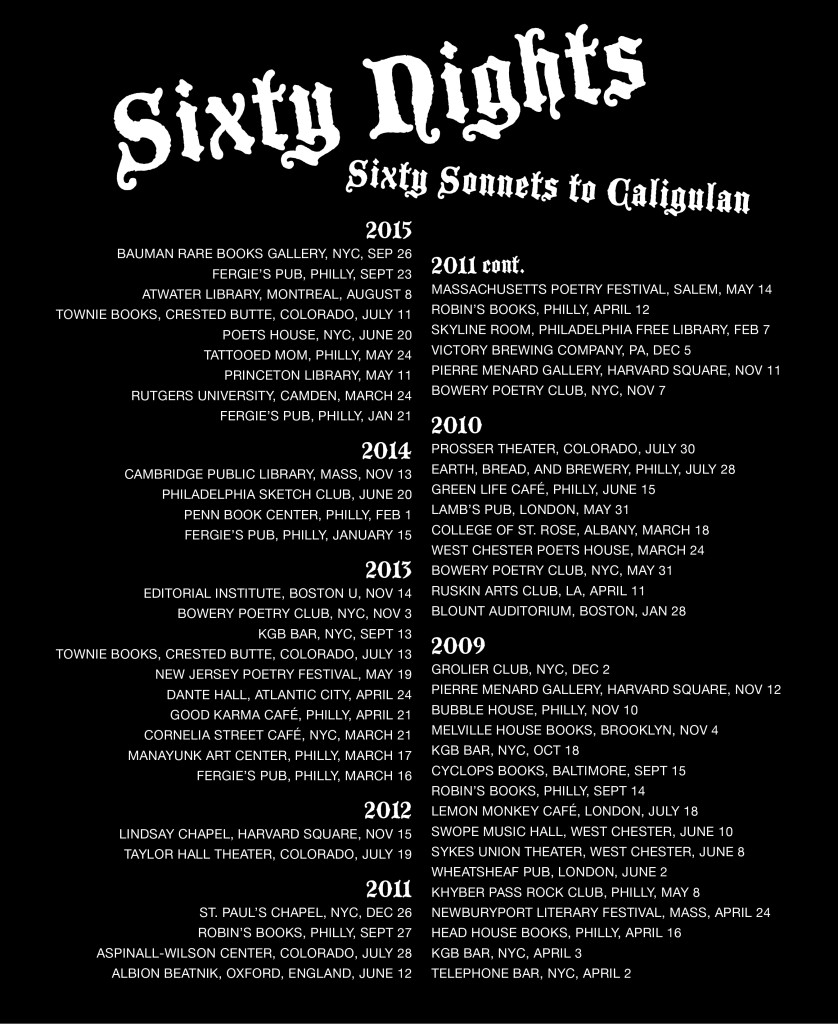
Back of Caligulan t-shirt listing Hilbert’s tour dates for the last two books and the publication parties for his third, Caligulan.
* * *
Tough-minded and precise, Ernest Hilbert’s lyrics, like his old mirror left out at the curb, turn an unflinching gaze on pieces of inner and outer landscapes we often push to the periphery. The poems in Caligulan fashion a stern, witty, and often poignant music out of seemingly unpromising elements courageously glimpsed, combined, or imagined. – Rachel Hadas, author of Halfway Down the Hall: New and Selected Poems and editor of The Greek Poets: Homer to the Present
Dark, vivid, precise, emotionally powerful. Another world seems to inhabit or encompass the everyday one. – Susan De Sola Rodstein
* * *
Most Americans don’t like to talk about death, but Ernest Hilbert doesn’t mind. Death and decay is what he sees in Caligulan—his third volume of poems after Sixty Sonnets (2009) and All of You on the Good Earth (2013)—and he has little interest in spinning “Fictions fielding hopes of glory / Where none should be fulfilled.” This is a question of temperament, as the title suggests, and reality. However we might feel, it’s relatively clear that the “seams” of order, as Hilbert puts it in one poem, have been “unsewn.” – Washington Free Beacon
The poems in Caligulan have a wonderful resonance. These new poems have something very “Cal” [Robert Lowell] about them, the very personal tone and settings combined with extraordinary perceptions. The fishing boats in “Barnegat Light” returning “as silhouettes” is a haunting, beautiful image. At unexpected moments, Hilbert reaches for, and finds, the sublime. – Michael Steffen, introduction at the Hastings Room Series, Cambridge, Massachusetts
Caligulan may have a lurid cover and title and you may be able to purchase t-shirts advertising the book in a bespoke heavy metal font, but such paraphernalia should not distract us from Hilbert’s very high ambitions for his poetry. Individual poems can function in a similar manner to the book as a whole: distracted by his sometimes disheveled persona, you may want initially to compare this poet to someone like Bukowski, which is by no means a mean comparison to make, but I think that Hilbert writes very carefully to make himself heir to Shakespeare, Milton, Wordsworth and Wallace Stevens.
– Edward Clarke, author of The Spirit of Poetry

